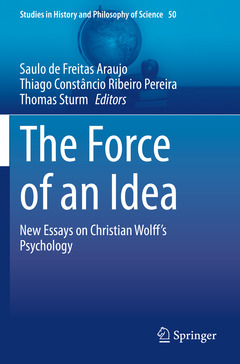Description
The Force of an Idea, 1st ed. 2021
New Essays on Christian Wolff's Psychology
Studies in History and Philosophy of Science Series, Vol. 50
Coordinators: Araujo Saulo de Freitas, Pereira Thiago Constâncio Ribeiro, Sturm Thomas
Language: English
Subjects for The Force of an Idea:
Keywords
Christian Wolff; Christian Wolff's Psychology; Origins of scientific psychology; German Metaphysics; Empirical psychology; Rational psychology; Psychology and Metaphysics; History of psychology; Philosophy of psychology; Philosophy of mind; Mind-body problem; German Psychology; German Philosophy; Eighteenth-Century Philosophy; Eighteenth-Century studies
Publication date: 07-2022
325 p. · 15.5x23.5 cm · Paperback
Publication date: 07-2021
325 p. · 15.5x23.5 cm · Hardback
Description
/li>Contents
/li>Biography
/li>Comment
/li>
This book presents, for the first time in English, a comprehensive anthology of essays on Christian Wolff's psychology written by leading international scholars. Christian Wolff is one of the towering figures in 18th-century Western thought. In the last decades, the publication of Wolff's Gesammelte Werke by Jean École and collaborators has aroused new interest in his ideas, but the meaning, scope, and impact of his psychological program have remained open to close and comprehensive analysis and discussion. That is what this volume aims to do.
This is the first volume in English completely devoted to Wolff's efforts to systematize empirical and rational psychology, against the background of his understanding of scientific method in metaphysics. Wolff thereby paved the way to the very idea of a scientific psychology. The book is divided into two parts. The first one covers the theoretical and historical meaning and scope of Wolff's psychology, both in its internal structure and in its relation to other parts of his philosophical system, such as logic, cosmology, aesthetics, or practical philosophy. The second part deals with the reception and impact of Wolff's psychology, starting with early reactions from his disciples and opponents, and moving on to Kant, Hegel, and Wundt.
The Force of an Idea: New Essays on Christian Wolff's Psychology shows not only that Wolff's psychological ideas have been misinterpreted, but also that they are historically more significant than traditional wisdom has it. The book, therefore, will be of interest to historians and philosophers of science, historians of philosophy and psychology, as well as to philosophers and psychologists interested in understanding the roots of scientific psychology in 18th and 19th century German philosophy.
1. Introduction: Reevaluating Christian Wolff’s Psychology
2. Who Was Afraid of Wolff’s Psychology? The Historical Context
3. The Origins and Development of Wolff’s Psychology in His German Writings
4. Empirical Psychology: Between Reason and Experience
5. Wolff and the Dogmas of Classical Rationalism
6. Wolff’s Idea of Psychometria
7. Wolff on Monadology and “Materialisterey”
8. Wolff and the Logic of the Human Mind
9. Image Composition as an Aesthetic-Epistemological Problem in Wolff’s Empirical Psychology
10. In-between Psychology and Moral Philosophy: Christian Wolff's Principle of Natural Obligation
11. The Relation between Psychology and the Other Parts of Metaphysics: Ontology, Cosmology, and Theology
12. Development and Diffusion of Wolff's Psychology through His Disciples and Followers
13. Wolffians and the Emancipation of Aesthetic Faculties
14. Wolff and the Beginnings of Experimental Psychology in the Eighteenth Century
15. The Science of the Soul and the Unyielding Architectonic: Kant versus Wolff on the Foundations of Psychology
16. Hegel and Wolff’s Psychologies
17. “The Most Excellent Psychological Systematist”: Wolff’s Psychology in the Eyes of Wilhelm Wundt
Saulo de Freitas Araujo is Professor of History and Philosophy of Psychology at the Federal University of Juiz de Fora in the State of Minas Gerais, Brazil. He is also Director of the Wilhelm Wundt Center for the History and Philosophy of Psychology (NUHFIP) at the same institution. His work focuses on the historical development and philosophical foundations of scientific psychology, especially in the German tradition. Among numerous publications, he is author of Wundt and the Philosophical Foundations of Psychology: A Reappraisal (Springer, 2016).
Thiago Constâncio Ribeiro Pereira is Professor of Psychology at the Fluminense Federal University in Volta Redonda, Rio de Janeiro, Brazil. He is also coordinator of the Philosophy and History of Psychology Research Group (FHIPSI) at the same institution. His current work focuses on Christian Wolff and eighteenth-century psychology, ideas of mind and body in psychological theories, and historiography of psychology.
Thomas Sturm is ICREA research professor at the Autonomous University of Barcelona (Spain). His work centers on three areas: Kant’s philosophy, theories of rationality at the intersection of philosophy and psychology, and the relations between philosophy and history of science. Main publications: Kant und die Wissenschaften vom Menschen (2009); How Reason Almost Lost Its Mind: The Strange Career of Cold War Rationality (co-authored with L. Daston, M. Gordin, P. Erickson, J. Klein and R. Lemov, 2013). Numerous articles in journals such as Erkenntnis, Kant-Studien, Studies in History and Philosophy of Science, or Synthese.
First book in English totally dedicated to the analysis and discussion of Christian Wolff's psychology
Shows how scientific psychology emerged from 18th century German philosophy
Analyzes the reception of Wolff's psychology among major philosophers and scholars, such as Kant, Hegel and Wundt




